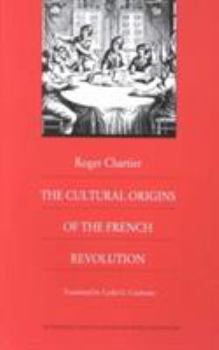The Cultural Origins of the French Revolution
Select Format
Select Condition 
Book Overview
Reknowned historian Roger Chartier, one of the most brilliant and productive of the younger generation of French writers and scholars now at work refashioning the Annales tradition, attempts in this book to analyze the causes of the French revolution not simply by investigating its "cultural origins" but by pinpointing the conditions that "made is possible because conceivable." Chartier has set himself two important tasks. First, while acknowledging the seminal contribution of Daniel Mornet's Les origens intellectuelles de la Révolution française (1935), he synthesizes the half-century of scholarship that has created a sociology of culture for Revolutionary France, from education reform through widely circulated printed literature to popular expectations of government and society. Chartier goes beyond Mornet's work, not be revising that classic text but by raising questions that would not have occurred to its author. Chartier's second contribution is to reexamine the conventional wisdom that there is a necessary link between the profound cultural transformation of the eighteenth century (generally characterized as the Enlightenment) and the abrupt Revolutionary rupture of 1789. The Cultural Origins of the French Revolution is a major work by one of the leading scholars in the field and is likely to set the intellectual agenda for future work on the subject.
Format:Paperback
Language:English
ISBN:0822309939
ISBN13:9780822309932
Release Date:January 1991
Publisher:Duke University Press
Length:260 Pages
Weight:0.96 lbs.
Dimensions:1.2" x 5.7" x 9.0"
Customer Reviews
2 ratings
How books brought about the French Revolution
Published by Thriftbooks.com User , 16 years ago
This was required reading for a graduate course in the history of the French Revolution. Roger Chartier's book The Cultural Origins of the French Revolution used "cultural history" to reconsider Daniel Mornet's work regarding the origins of the French Revolution. With the assistance of writings from Jurgen Habermas, Chartier argued that in the eighteenth century a new form of communication, the "bourgeois public sphere," emerged where private citizens could espouse their ideas of "reason" without interference from the Church or state. This finding by Habermas was critical to characterizing the eighteenth century as the Age of Enlightenment. It meant that rational private people took their judgments and publically developed them through the arts, in salons, and in the Republic of Letters. "The exercise of public reason by private individuals was subjected to no limit, and no domain was to be forbidden. The critical exercise of reason was no longer reined in by the respect due to religious or political authority" (Chartier, 21). However, his research did show that the book industry quadrupled between 1700 and the 1780's. In addition, the availability through borrowing institutions and increased ownership of books, especially cheaper forms of printed materials, such as pamphlets not only increased significantly, but also allowed reading to become a more individual pursuit by all classes of French society. "Printing thus made possible the constitution of a public realm that was unreliant on proximity--a community with no visible presence" (32). In addition, Chartier he dug into the historical revolutionary documentation to show that the Enlightenment did not make the revolution, but that revolutionaries adopted cultural changes taking place in French society to buttress their arguments advocating revolutionary change. Chartier found that "...thanks to the widespread diffusion of skills that made possible a larger circulation of the written word, people acquired habits of free judgment and contradictory criticism" (167). The previous quote illustrated that Chartier's findings were in agreement with both Van Kley's and Alexis De Tocqueville's theses showing that in the prelude to revolution, there was a general decline of faith in the Church and monarchy. Chartier even saw the influence that the Jansenists played leading up to the Revolution. However, Chartier did not totally agree with Van Kley's hypothesis. As an example, Chartier thought that the pernicious comments and posters against the monarchy largely due to Louis XV's sexual escapades, were primarily confined to the environs of Paris, and in the fifteen years preceding the Revolution, became less numerous and virulent against Louis XVI. Thus, Chartier highlighted different evidence from Van Kley's to further his thesis. Chartier noted a steady secularization of French society starting in the 1750's. The first piece of evidence he used was the increase in illegitimate birth
An Interesting Idea
Published by Thriftbooks.com User , 24 years ago
M. Chartier has written an intellectual, tightly argued work that has been greatly beneficial to my understanding of the revolution in France. His notion that the ideas of the Enlightenment influenced revolutionary thought indirectly through a "demystification" of the monarchy is very intriguing. This book did much to make me question some of my long-held presumptions about the French Revolution.






